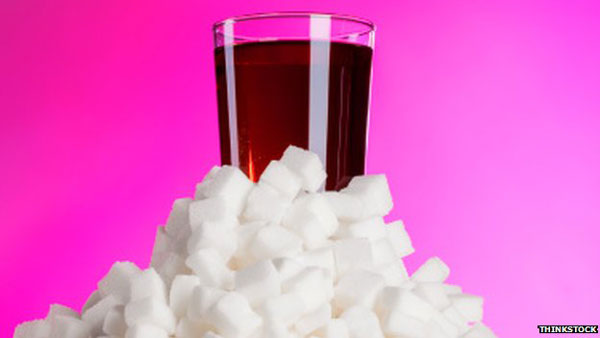Signs warning shoppers how much exercise they need to do to burn off calories in sugary drinks can encourage healthier choices, US research suggests.

Sugary drinks, such as fruit juices and fizzy drinks, can contain up to nine tablespoons of sugar in one can
A study of teenagers' purchasing habits found they bought fewer sugary drinks and more water when the signs were up.
The most effective sign said it took five miles to walk off the 250 calories in a sugary drink.
Public Health England said the study showed simple health messages worked.
Study leader Dr Sara Bleich, associate professor at the Bloomberg School, John Hopkins University, said people do not understand calorie content on its own on a label.
"What our research found is that when you explain calories in an easily understandable way such as how many miles of walking is needed to burn them off, you can encourage behaviour change."
For six weeks, the brightly coloured signs were displayed in corner shops in neighbourhoods in Baltimore, in full view of young customers buying sugary drinks.
Four different signs were used in the shops. Two translated the calories in the drinks into the amount of exercise needed to burn off those calories.
One sign said it would take 50 minutes of running to work off the 250 calories - or 16 teaspoons of sugar - contained in a 590ml bottle of fizzy drink, sports drink or fruit juice.
The remaining signs listed the sugar content of the drink and the calories contained in the drink.
A can of fizzy drink, which is 330ml in size in the UK, contains around nine teaspoons of sugar.
To find out the impact of the signs, the researchers - writing in the American Journal of Public Health - interviewed children aged between 12 and 18 years old leaving the shop.
Out of the 35% of those interviewed who said they saw the signs, 59% said they believed the sign and 40% said their behaviour had changed as a consequence.
Before the signs were put up, 98% of drinks bought in the shops were sugary ones. After six weeks, this was reduced to 89%.
During the time the signs were on view, sales of larger bottles of fizzy drinks went down from 54% to 37% of all purchases.
The percentage of teenagers who chose to buy no drink at all in the shops increased from 27% to 33%.
This change in behaviour continued for several weeks after the "exercise" signs were taken down, the study adds.
In total, more than 3,000 drinks purchases were observed by the research team.
Dr Bleich said the findings could help in the fight against obesity,
"This is a very low-cost way to get children old enough to make their own purchases to drink fewer sugar-sweetened beverages and they appear to be effective even after they are removed.
"Using these easy-to-understand and easy-to-install signs may help promote obesity-prevention or weight loss."
Dr Alison Tedstone, chief nutritionist at Public Health England, said: "This is an interesting study which demonstrates that we need to use a range of clear, simple messages to help people follow healthier diets.
"This is one of many possible approaches and PHE continues to keep the evidence base for behaviour change under review."
PHE says Change4Life uses "sugar reveals" in its campaigns which have been proven to have an impact on a person's selection of drinks.
Dr Tedstone added: "We all need to make sure we get our six to eight glasses of fluids a day not from sugary drinks but from water, lower fat milk, no added sugar or sugar-free drinks."
Kawther Hashem, a nutritionist at campaign group Action on Sugar said that any measure which helps draw attention to the dangers of consuming too many calories - was "a good thing, especially if it converts awareness into people taken positive action and switching to less calorific drinks".
She said it was also critical that soft drink manufacturers were made to reduce the sugar content of their drinks.
One quarter of all adults and one in five children in the UK are classified as obese.
BBC


























